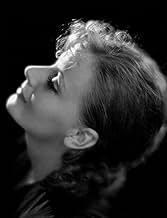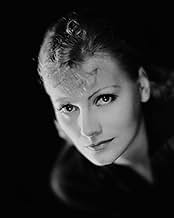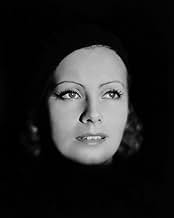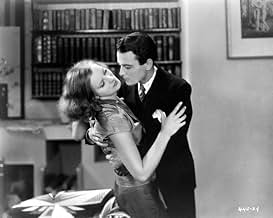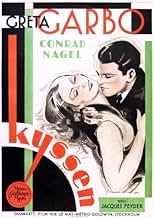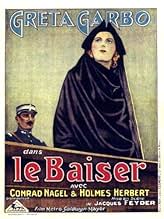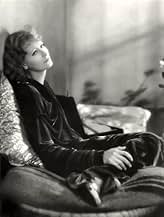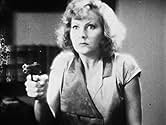IMDb RATING
6.8/10
1.3K
YOUR RATING
An unhappily married woman is caught up in scandal and murder when her affection toward a young man is misinterpreted.An unhappily married woman is caught up in scandal and murder when her affection toward a young man is misinterpreted.An unhappily married woman is caught up in scandal and murder when her affection toward a young man is misinterpreted.
- Director
- Writers
- Stars
Symona Boniface
- Gossip in Museum
- (uncredited)
Allan Cavan
- Prison Warden
- (uncredited)
André Cheron
- Prosecutor
- (uncredited)
Carrie Daumery
- Party Guest
- (uncredited)
Ruth Feldman
- Scrubwoman
- (uncredited)
Lee Phelps
- Tour Guide
- (uncredited)
Philip Sleeman
- Lounge Lizard
- (uncredited)
- Director
- Writers
- All cast & crew
- Production, box office & more at IMDbPro
6.81.3K
1
2
3
4
5
6
7
8
9
10
Featured reviews
The end of an era
The Kiss (1929) was the final silent film produced by Metro-Goldwyn-Mayer. It was also the final silent film of stars Greta Garbo and Conrad Nagel.
The subtle acting and sophisticated (and purely visual) storytelling show how far silent cinema had come by the late 1920s. When talkies took over Hollywood, the acting regressed back to that of the stage, the background music was replaced with static hiss, and even basic film-making techniques were restrained due to the sound equipment. It would take a few years for sound technology to grow in sophistication.
Removed from its distinction as the end of an era, The Kiss is an average melodrama, especially for Garbo, who plays an unhappily married woman in love with another man. She looks luminous and acts completely with her eyes, her brilliance showing through even in material such as this. Conrad Nagel is competent in an unchallenging role, and Lew Ayres is simultaneously adorable and somewhat sinister as the young man smitten with Garbo.
The big twist is predictable and the recorded score is cheesy, using Tchaikovsky's Romeo and Juliet theme as the lovers' leitmotif, but overall, this is a skillfully made bit of melodramatic fluff, the last gasp of MGM's silent output.
The subtle acting and sophisticated (and purely visual) storytelling show how far silent cinema had come by the late 1920s. When talkies took over Hollywood, the acting regressed back to that of the stage, the background music was replaced with static hiss, and even basic film-making techniques were restrained due to the sound equipment. It would take a few years for sound technology to grow in sophistication.
Removed from its distinction as the end of an era, The Kiss is an average melodrama, especially for Garbo, who plays an unhappily married woman in love with another man. She looks luminous and acts completely with her eyes, her brilliance showing through even in material such as this. Conrad Nagel is competent in an unchallenging role, and Lew Ayres is simultaneously adorable and somewhat sinister as the young man smitten with Garbo.
The big twist is predictable and the recorded score is cheesy, using Tchaikovsky's Romeo and Juliet theme as the lovers' leitmotif, but overall, this is a skillfully made bit of melodramatic fluff, the last gasp of MGM's silent output.
Garbo puts it over
Greta Garbo's last silent film finds her unhappily married to Andres Randalf, tearfully fending off the advances of old boyfriend Conrad Nagel and letting young and callow Lew Ayres steal A Kiss from her. Ayres is the son of Holmes Herbert who is her husband's business partner complicating things even more.
You can't blame Ayres though. In that last silent film Garbo is certainly at her most alluring and she carries the film off beautifully.
Ayres is thinking with his male member and he's at an age where there is more tendency to do that. When Randalf catches him with Garbo he starts beating on the kid as any jealous husband would. He gets shot for his troubles and Garbo is arrested. She also shields young Ayres telling him to leave the premises.
This is where Nagel comes in. Even without dialog as per usual in a courtroom scene he does well in putting over the dramatic impact of the trial. All actors love courtroom drama and Nagel gets some good innings in here.
I have to say though, French forensics leave a lot to be desired if they are manipulated in the way they are.
In the hands of a lesser actress The Kiss would have been melodramatic claptrap. But Garbo can make anything look positively poetical.
You can't blame Ayres though. In that last silent film Garbo is certainly at her most alluring and she carries the film off beautifully.
Ayres is thinking with his male member and he's at an age where there is more tendency to do that. When Randalf catches him with Garbo he starts beating on the kid as any jealous husband would. He gets shot for his troubles and Garbo is arrested. She also shields young Ayres telling him to leave the premises.
This is where Nagel comes in. Even without dialog as per usual in a courtroom scene he does well in putting over the dramatic impact of the trial. All actors love courtroom drama and Nagel gets some good innings in here.
I have to say though, French forensics leave a lot to be desired if they are manipulated in the way they are.
In the hands of a lesser actress The Kiss would have been melodramatic claptrap. But Garbo can make anything look positively poetical.
One of Garbo's better silents
I've got to admit up front that I have long felt that Greta Garbo was a bit overrated as an actress. All too often, she was stuck in super-melodramatic films involving either adultery or with Garbo playing an irresistible "super-vamp". While the public loved this persona, the films seemed quite derivative and clichéd. There are only so many films like this you can watch until they blend together.
Fortunately, she also made some dandy films like NINOTCHKA, QUEEN Christina and THE KISS. While superficially the film seems just like another adultery film, Garbo was given better material--as she was a woman who WANTED to commit adultery but couldn't bring herself to cheat on her much older husband. I'm glad the film didn't pursue this expected plot line but instead the film is about the consequences when the husband THINKS she's cheating on him when she isn't. This led to a dandy finale where there is a nice plot twist.
Overall, this film excelled because Garbo did NOT stare in a pained way into space as she so often did in films where she played a married woman trapped in a loveless marriage. Here, she plays a more believable and well-rounded personality--someone who seemed much more human than the usual Garbo character.
With good production values and only one minor problem (a repetitive and sappy soundtrack), this is well worth a look.
Fortunately, she also made some dandy films like NINOTCHKA, QUEEN Christina and THE KISS. While superficially the film seems just like another adultery film, Garbo was given better material--as she was a woman who WANTED to commit adultery but couldn't bring herself to cheat on her much older husband. I'm glad the film didn't pursue this expected plot line but instead the film is about the consequences when the husband THINKS she's cheating on him when she isn't. This led to a dandy finale where there is a nice plot twist.
Overall, this film excelled because Garbo did NOT stare in a pained way into space as she so often did in films where she played a married woman trapped in a loveless marriage. Here, she plays a more believable and well-rounded personality--someone who seemed much more human than the usual Garbo character.
With good production values and only one minor problem (a repetitive and sappy soundtrack), this is well worth a look.
Garbo's Finale To Silents
"The Kiss" has a fairly predictable plot, but interesting acting from the excellent cast keeps you watching on this one. As others wrote, the Vitaphone soundtrack here was pretty poor, except for one section; all the melodies have been used before in many silent films. Listening to classical Tchaikovsky is not really appropriate for a modern film like "The Kiss."
Greta has some great closeups in this film, but in certain sections seems to be sleepwalking through her role. Conrad Nagel was a delight to watch, he always seemed much more handsome on screen than in his still photos. He is the hero in this film, if the film could really be said to have a hero after everyone lies in court.
Lew Ayres was adorable, and had to have made a great impression on studio bosses when the film was first released, for he went straight from this film into his classic "All Quiet On The Western Front", which made him a star. Holmes Herbert, so good in Pola Negri's "A Woman of the World", here is aged with makeup and plays Lew Ayres' father convincingly. Anders Randolf was a bit jarring as Greta's husband, but his performance was fine too.
The print was decent on this MGM release, compared to another Garbo feature, "The Single Standard", made earlier. But of both films, "The Single Standard" is by far the superior film technically, plot-wise, and in its performances, though its print is more worn.
Greta has some great closeups in this film, but in certain sections seems to be sleepwalking through her role. Conrad Nagel was a delight to watch, he always seemed much more handsome on screen than in his still photos. He is the hero in this film, if the film could really be said to have a hero after everyone lies in court.
Lew Ayres was adorable, and had to have made a great impression on studio bosses when the film was first released, for he went straight from this film into his classic "All Quiet On The Western Front", which made him a star. Holmes Herbert, so good in Pola Negri's "A Woman of the World", here is aged with makeup and plays Lew Ayres' father convincingly. Anders Randolf was a bit jarring as Greta's husband, but his performance was fine too.
The print was decent on this MGM release, compared to another Garbo feature, "The Single Standard", made earlier. But of both films, "The Single Standard" is by far the superior film technically, plot-wise, and in its performances, though its print is more worn.
Good Silent
Kiss, The (1929)
*** (out of 4)
A flirtatious married woman (Greta Garbo) has an innocent relationship with a young kid (Lew Ayres) but when she gives him a friendly kiss goodbye tragedy follows. The main highlight here is Garbo, in her final silent and Ayres, in his film debut and their chemistry together. The two work remarkably well together and their innocent relationship really comes off as fun. The "tragedy" that happens plays out well but the really poor direction by Jacques Feyder kills this from being better. The TCM print ran 62 minutes but Maltin's book lists the running time at 82 minutes. I don't think anything was cut but instead they played the film at a higher FPS rate. This was also MGM's final silent picture.
*** (out of 4)
A flirtatious married woman (Greta Garbo) has an innocent relationship with a young kid (Lew Ayres) but when she gives him a friendly kiss goodbye tragedy follows. The main highlight here is Garbo, in her final silent and Ayres, in his film debut and their chemistry together. The two work remarkably well together and their innocent relationship really comes off as fun. The "tragedy" that happens plays out well but the really poor direction by Jacques Feyder kills this from being better. The TCM print ran 62 minutes but Maltin's book lists the running time at 82 minutes. I don't think anything was cut but instead they played the film at a higher FPS rate. This was also MGM's final silent picture.
Did you know
- TriviaMGM's last non-talking picture.
- GoofsIn the opening credits, the name André, Conrad Nagel's character, is spelled "Ardré."
- Alternate versionsMGM also released this movie without a soundtrack, as a totally silent film.
- ConnectionsFeatured in MGM Parade: Episode #1.30 (1956)
- How long is The Kiss?Powered by Alexa
Details
Box office
- Budget
- $257,000 (estimated)
- Runtime
- 1h 2m(62 min)
- Sound mix
- Aspect ratio
- 1.33 : 1
Contribute to this page
Suggest an edit or add missing content

